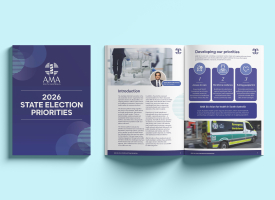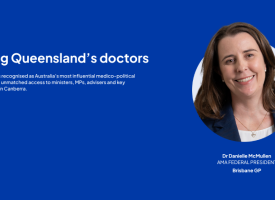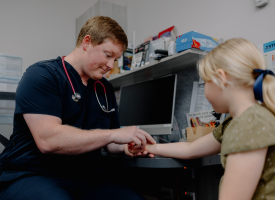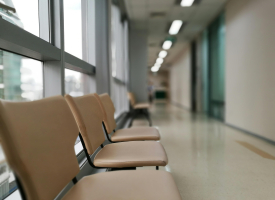Transcript: AMA President at meeting of associations and medical colleges in Canberra to discuss health reform
AMA President Dr Danielle McMullen at doorstop interview at the start of a meeting in Canberra of health experts from medical associations and colleges to discuss healthcare reform.
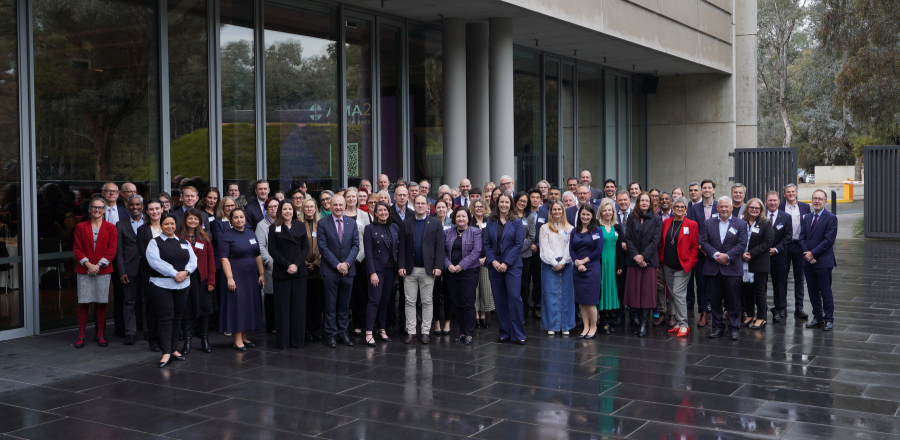
DANIELLE MCMULLEN: Good morning, I'm Dr Danielle McMullen, the Federal President of the Australian Medical Association. We're gathered here today with 100 of Australia's leading doctors and health policy experts to talk about the prickliest issues affecting our healthcare system. We all know our healthcare system is under strain: whether it's the logjam in our public hospitals, the workforce shortages right across the country, but particularly in rural and remote Australia, and the closures that we're seeing even in private hospital services, we all need to come together and urgently address these issues. These are affecting Australians every day, and therefore they're affecting doctors. We're a profession trained to care, and the issues that hurt our patients hurt us too. So today, we'll talk about solutions, everything from workforce supports through to having the right regulatory settings, how we support our public and private sector to deliver that care that Australians so urgently need.
I've got colleagues with me today. I'll hand over to Stephen Gourley, the President of the College for Emergency Medicine.
DR STEPHEN GOURLEY: Good morning, everyone. Hi, my name is Dr Stephen Gourley. I'm an emergency physician and I'm the President the Australian College for Emergency Medicine. Our emergency department presentations are growing year and year. The demand is very, very high, and we're struggling to meet that demand. We're looking forward to today's constructive discussions about how we might meet that demand as we move into the future, provide the care that we know our patients desperately need and deserve.
DANIELLE MCMULLEN: Then Dr RT Lewandowski.
DR RT LEWANDOWSKI: Thanks. My name is Dr RT Lewandowski, and I'm the President of the Rural Doctors Association of Australia, and I'm excited to be here today. We're really looking forward to talking about, again, constructively, ways to solve problems that rural patients particularly suffer health inequities. And there are ways around that we actually do have solutions to, and it's going to be great to put forward some of those solutions and to talk about it and be able to present it. We do need reform in funding; we need reform in staffing. They distort the numbers in the bush, but that's for reasons that are predictable and solvable. And I'm really looking forward to that, and ultimately, what we want is help for rural Australians. I think we can achieve that.
DANIELLE MCMULLEN: Questions?
QUESTION: So there have been a number of issues in regional and rural health precincts. What are some of the issues that will be addressed today? That's open for anyone.
DR LEWANDOWSKI: So certainly workforce shortages. There needs to be a strategy. There needs to be a workforce strategy, particularly for rural. And it needs to be kind of independent of random ideas and thoughts, but truly well thought out and planned. The health inequities also have to do with access, but not purely access - again, access needs to be thought out. We need access to quality care. Rural patients deserve quality healthcare. They deserve to have the same life expectancy and the same outcomes, and the same expectation of quality life years as their counterparts in urban Australia. And the issues at hand then are how to provide that, and it's doable. We just have to have the solutions and the strategy and stick with it.
QUESTION: How would you describe what we're currently seeing with rural and regional Australia in terms of the health sector?
DR LEWANDOWSKI: Yeah, so it's not set up well. Unfortunately, right now it's often thought of as a subset of urban. But the problems, the issues and the way healthcare is delivered there is very different. That's why we need a separate strategy. We struggle right now with the number of doctors out there. We need to train them, and then we also need to support them, and supporting them in lots of ways, including Medicare or some sort of funding system. And the funding system - just like the healthcare doesn't work exactly the same as it does in the city, the funding really doesn't work that way either. Unfortunately, it's set up to work that way and so it's set up to fail, so we need to look at funding reform as well.
And then access, you know? The tyranny of distance. The farther you are out from the city, the less access you have to other services. We have ways to deliver the services close to home, quite a few of them, but we need to actually be enabled to do that. And hopefully we'll be able to present the solutions that are already there in a way that's cogent and in a way that can be acted on.
QUESTION: We've been seeing hospitals closing across regional Australia. How are we planning to tackle this?
DANIELLE MCMULLEN: You can go rural- you've got the rural questions now.
DR LEWANDOWSKI: Listen, they should- guess what? You're entitled to healthcare no matter where you live, and there are lots of reasons that they're closing. But some of them, again, is the model. You can't take the model from Canberra, Sydney, Melbourne, and put it out in the middle of nowhere. It's not the middle of nowhere, it's a nice place to live. I shouldn't say that. But you just can't. We do have models, and right now, one of the models is - it's called Rural Generalist training. And we are increasing and intend to continue to increase Rural Generalist training so that we actually can provide primary care, which is actually what you need for health. But then also the access to emergency services and hospital-based care using a generalist approach as opposed to specialist approach, just because there's not the volume in the rural and regional areas to support specialty and subspecialty. And so again, healthcare has got to be delivered a little bit differently there.
QUESTION: Do you think there's enough adequate government support for regional and rural areas to ensure that we do have equitable care across Australia?
DR LEWANDOWSKI: No, I don't. I think that there is a fair bit of support, but it's hodgepodge piecemeal and not well thought out oftentimes. I don't think there's no support. I think the support there is, is inadequate, but maybe not terribly so if it could be done in a way that has a strategy that actually makes sense, is the answer. It is difficult because of the rural sites, you know, or hospitals particularly run by states, not federal. And there's some tweaks that I think ought to be made in the National Health Reform Agreement as well to make sure that funding for states also includes funding for rural hospitals and delivery of rural healthcare, training of rural providers, etcetera.
QUESTION: Awesome. And I might just direct this to the President if that's all right? We need an independent national workforce planning agency to ensure the changes are backed by solid evidence. Can you talk to me about what that means?
DANIELLE MCMULLEN: I think there's likely to be broad agreement amongst the colleges and societies and us here today. The colleges and societies are tasked with training the future of our doctors, of our medical workforce. And yet, at the moment we don't have the data, the strategy, the plan for how many doctors we need, what kind we need and where we need them to work. It's been about a decade now of that information vacuum, and so we're really seeing the cracks start to show. An independent health workforce agency would help set that strategy, define the data sets and monitor where we need that workforce and make sure that we can put all of our best efforts into training the future of the health workforce that we really need.
QUESTION: And final question, what do you hope to come out of today's meeting?
DANIELLE MCMULLEN: Today's meeting really is an opportunity to discuss the thorniest issues. What we do hope to generate is some shared agreement, perhaps on principles going forward, but generally it's a way to- it's bringing all of our different specialties together to talk about issues that we all share but different perspectives between our different specialty groups.
ENDS
